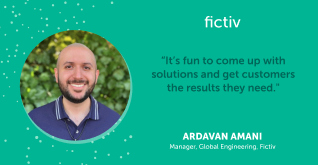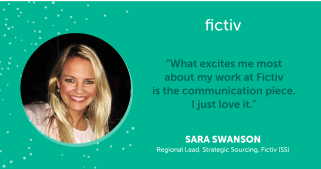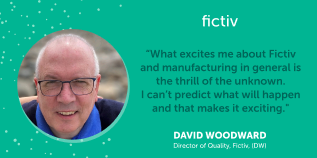Time to read: 4 min
It’s National Manufacturing Day, a great opportunity to reflect on the industry, where it’s headed, and how people feel about their work. Recently, I sat down with several Fictiv employees to get their take on the industry, what excites them about their work, and what advice they’d share with those considering careers in the field.
The Career Path to Manufacturing
A career in manufacturing isn’t always linear. For Sara Swanson, Regional Lead of Strategic Sourcing, it started with architecture. “From the beginning, I worked very closely with engineers, contractors, subcontractors, you name it. Next, I moved to aerospace and then to working directly with suppliers.” From there, she learned more about manufacturing and came to love it. According to Swanson, her favorite part of manufacturing is “working directly with our suppliers to help solve challenges.”
For Ardavan Amini, Global Engineering, an early focus on design engineering in college led to several industries and eventually manufacturing. According to Amini, “What attracted me to manufacturing was the chance to view customer challenges as a puzzle needing to be solved. Over time, I used my product design background to help customers find solutions to their design or production issues.”
David Woodward, Director of Quality, sums it up this way: “I’ve been in this industry since before the invention of the wheel. In my experience, manufacturing is really the best industry to work in.”
Key Trends
Ask most manufacturing engineers what industry trends they’re seeing and one stands out: The role of technology is in tackling today’s most pressing challenges, including supply chain disruptions, or workforce shortages, or product development, or sustainability initiatives.
Technology
“Whether it’s improved CAD software or improved machine technology, we now have access to faster, better quality machines and products than ever before. It’s astonishing,” says Swanson.
And of course AI. “The use of machine learning and AI for new product development is fascinating,” she continues. “It all seems to come down to technology and how it supports different ways of doing things.”
Collaboration
One of the benefits of a career in manufacturing today is a greater opportunity to work cross-functionally. For Amini, “The lines between job functions are getting blurred—in a good way. As a product designer, I used to work in a silo. Now I’m more of a generalist and get to collaborate across the whole organization, which is far more interesting.”

Sustainability
Another notable trend is an increased emphasis on sustainable manufacturing. Companies are taking more responsibility and exhibiting a greater commitment to limiting their carbon footprint. According to Amini, “There’s more focus on greener solutions and less on brute force solutions, which might negatively impact the environment. In general, everyone within manufacturing is more committed to sustainability than ever before.”
What’s Exciting About Manufacturing

When asked what’s exciting about manufacturing, everyone responded enthusiastically about customers and coworkers. For Amini, “What excites me most is the challenge. Say a customer comes in with a 30-part bill of materials—all with different requirements. It’s like solving a puzzle. We want to figure out how we can deliver each part faster, cheaper, and better. It’s fun to come up with solutions and get customers the results they need.”
Woodward agrees. “What excites me about Fictiv and manufacturing in general is the thrill of the unknown. I can’t predict what will happen and that makes it exciting. Manufacturing is really the best industry to work in. For Swanson, it’s communicating with customers and suppliers. “I can reach out to my manufacturing partner at any time of the day, regardless of how late it is, to talk through challenges with him. This sort of close working relationship is what I love about my job.”
Career Advice for Those Interested in Manufacturing
Since one of the aims of National Manufacturing Day is to encourage people to consider entering the field, we invited each person to offer career advice. Here’s what they said.
Stay Open
Swanson learned early on to “always stay open to learning new things. She also encourages people to stay open to learning from all sources—including books, colleagues, customers, and manufacturing partners. Oh, and “try not to be a know-it-all and stay humble.” Amini agrees. “It really helps to be open-minded. Manufacturing is so much more than the theories you learn in school.”
Woodward thinks everyone should be a generalist and avoid choosing a focus too early on. Also, they should “avoid getting stuck in a rut. That’s my advice to young people considering working in manufacturing.

Always Be Learning
Woodward also wants people to know it’s important to always be learning. “Go learn new skill sets and don’t be afraid of adopting new tools. It’s an incredibly exciting time to be in this industry and there are so many opportunities if you’re willing to work hard and stay open to new ways of doing things.
According to Amini, people should “Try to leave behind assumptions and stay open to learning new ways of doing things. Also, you don’t always need formal training. Lots of people learn on the job. In fact, most people learn on the job. So don’t be discouraged.”
Challenge the Status Quo
My final piece of advice to anyone interested in a career in manufacturing would be to challenge the status quo. The largest inhibitor to innovation is to ignore advancements in technology and to stick to the status quo. Adopting new technology is the key to unlocking innovation.
Keep up the good work, everyone. It’s a wonderful time to work in manufacturing.
Happy National Manufacturing Day 2023!








